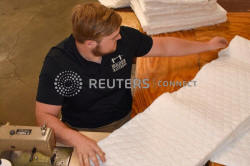U.S. mattress business springs back from pandemic
shutdown
 Send a link to a friend
Send a link to a friend
 [June 15, 2020] By
Timothy Aeppel [June 15, 2020] By
Timothy Aeppel
(Reuters) - The U.S. mattress business has
bounced back after months of shutdowns from the coronavirus pandemic
kept customers away.
Sales at Holder Mattress Co. were up about 30% last month, compared to a
year ago, after the company started letting people back into its two
northern Indiana stores, said Lauren Taylor, president and granddaughter
of the company's founder.
"There's either a lot of pent up demand" for bedding, she said, "or
people are looking at spending money at home, since they canít spend it
on things like vacations."
Holder is one of several small businesses Reuters is tracking through
this downturn and the now-nascent recovery. Millions of small businesses
in the U.S. face an uncertain future after the novel coronavirus
pandemic shut down shops, restaurants, schools and travel in the world's
biggest consumer economy.

Taylor said the company has adapted to rules and restrictions she never
imagined before the crisis. When she first reopened a month ago, for
instance, Taylor required customers to make appointments to shop, so
they could control who was in the store and sanitize surfaces between
every shopper.
Indiana moves to the fourth phase of its reopening on Friday, when
retail stores can operate at full capacity. Taylor said she'll allow
multiple shoppers then, adding "we wonít turn anybody away."
Another key part of her business, home delivery, is still facing
restrictions. To limit potential exposure for her workers, for instance,
she requires buyers to have just one person in the home in contact with
the delivery crew, and for that person to fill out a health
questionnaire ahead of time.
Last month's strong sales are a bright spot for Taylor, but she's still
nervous about the months ahead.
[to top of second column] |

Mattress technician Ben Freygang works in Kokomo, Indiana, U.S. in
this July 3, 2019 handout photo. Nicole Zaremski/Handout via REUTERS

The company received just over $100,000 from the Payroll Protection Program, a
federal program aimed at keeping people employed through the shutdowns. Taylor
never laid off any of her nine employees.
Taylor said the PPP funds will run out this week and she's confident she'll get
the loan forgiven by submitting detailed records of how she spent the money. The
program specified that most, but not all, of the funds be used to keep workers
employed. "We've documented more than necessary," she said, adding the spread
sheet she received from her bank doesn't require the detailed breakdown of
spending she's accumulated.
Sheís also been approved for a $282,600 Economic Injury Disaster Loan. Thatís a
30-year loan with a 3.75% interest rate, which she said will give her company an
important buffer.
The biggest surprise so far has been customers' attitudes about masks, she said.
Customers at their store in Carmel, Indiana, a 95,000 population upscale suburb
of Indianapolis, have happily donned face coverings, she said, while many
customers at her Kokomo, Indiana, store balked. Kokomo is a 58,000 population,
blue-collar city.
With the state's new reopening guidelines, that will no longer be an issue,
Taylor said. "Masks will go from recommended to optional - we will no longer
press people to wear them," she said, though staff will continue to be masked
for the near term.
(Reporting by Timothy Aeppel; Editing by Heather Timmons and Diane Craft)
[© 2020 Thomson Reuters. All rights
reserved.] Copyright 2020 Reuters. All rights reserved. This material may not be published,
broadcast, rewritten or redistributed.
Thompson Reuters is solely responsible for this content. |